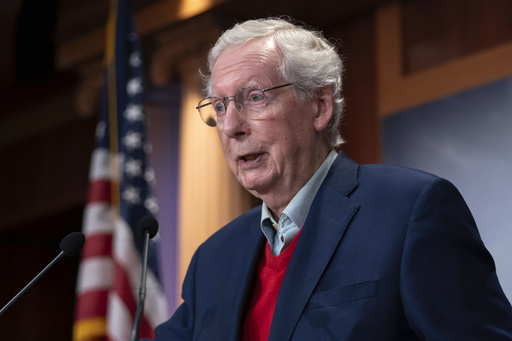WASHINGTON — The fate of the U.S. House majority is uncertain as of Wednesday, teetering on the edge between Republican leadership that could usher in a new phase of unified GOP governance and a potential shift to the Democrats, who aim to serve as a bulwark against a possible Trump second-term agenda. The outcome hinges on a few individual seats, or perhaps even just one, and final results may take time, potentially delaying a decision until next week or later.
After Republicans gained control of the U.S. Senate by winning seats in states like West Virginia, Ohio, and Montana, House Speaker Mike Johnson expressed confidence that the House would follow suit. He stated, “Republicans are poised to have unified government in the White House, Senate, and House,” on Wednesday.
President-elect Donald Trump, who secured both the Electoral College and the popular vote against Democratic Vice President Kamala Harris, is consolidating his influence within the Republican Party, endorsing newcomers and paving the way for his return to the White House. Johnson revealed that GOP members in Congress are drafting an ambitious 100-day plan with Trump, who has high aspirations regarding his legacy.
The proposed agenda includes tax reductions, enhanced border security, and significant reductions to federal regulations if the GOP claims victory in both the White House and Congress. Trump has also made commitments towards mass deportations and retaliation against perceived adversaries. Furthermore, Republicans aim to restructure federal agencies and revamp the government workforce with input from external think tanks, with Johnson asserting their goal is to bring the federal government “to heel.”
However, Johnson has faced challenges in managing the House, a situation that is unlikely to improve with the new Congress. Hard-liners, such as Rep. Marjorie Taylor Greene and Rep. Matt Gaetz, have frequently disrupted GOP leadership, making this session one of the most tumultuous in recent political history. If the Republican majority, currently at a narrow four-seat margin, diminishes further, legislative action could come to a halt.
Democratic Minority Leader Hakeem Jeffries asserted that the House remains highly competitive. With two Republican incumbents defeated in New York, he indicated that potential gains for the Democrats lie in states like Arizona, Oregon, Iowa, and California, where results remain too early to call. “We must count every vote,” Jeffries emphasized.
The House races have evolved into a competitive back-and-forth, with each party gaining and losing seats amid the routine redistricting process, which has adjusted boundaries in states like North Carolina, Louisiana, and Alabama. A significant portion of the vote outcome seems to hinge on results from the West, especially California, where several House seats are hotly contested, and mail-in ballots are still being counted following the election.
At his election night event in Florida, Trump described the results as an “unprecedented and powerful mandate” for the Republican Party, praising the Senate victories as “incredible” and commending Johnson’s leadership. From the Capitol, Senate GOP Leader Mitch McConnell, who has been a critical voice regarding Trump in private, acknowledged the day’s success as “a hell of a good day.”
Senate Republicans made significant gains, flipping three Democratic-held seats while successfully defending against challengers in Texas and Florida, where incumbents Sen. Ted Cruz and Sen. Rick Scott prevailed. In West Virginia, Governor Jim Justice converted the seat vacated by retiring Sen. Joe Manchin. Republicans also claimed the seat of Democrat Sen. Sherrod Brown in Ohio with Bernie Moreno, a GOP luxury car dealer, and Tim Sheehy defeated Senator Jon Tester in Montana.
On the Democratic side, notable victories were achieved, including Rep. Elissa Slotkin’s win for an open Senate seat in Michigan and the reelection of Sen. Tammy Baldwin in Wisconsin. The race in Pennsylvania between Democratic Sen. Bob Casey and Republican Dave McCormick remained unresolved.
Another milestone was reached by the Democrats with the election of two Black women, Lisa Blunt Rochester from Delaware and Angela Alsobrooks from Maryland, to the Senate. This achievement marked a historical moment, as only three Black women, including Harris, have served in the Senate, but never concurrently.
Overall, Senate Republicans are positioned to potentially pave the way for their most substantial majority in years. This outcome demonstrates McConnell’s effectiveness in navigating a pathway to power, even as he has privately described Trump in unflattering terms following the January 6, 2021, Capitol events. During a news conference, McConnell chose not to address inquiries about his previous criticisms of Trump, framing the election results as a referendum on the current Biden administration. He asserted that a Republican-controlled Senate would establish “guardrails” to preserve the filibuster from alteration.
Despite these developments, uncertainty lingers regarding who will take on the mantle of Senate leadership as McConnell prepares to step down. South Dakota Sen. John Thune and Texas Sen. John Cornyn are seen as leading candidates to succeed McConnell in a secret-ballot election that is set for when senators reconvene in Washington next week.


